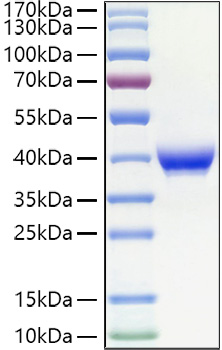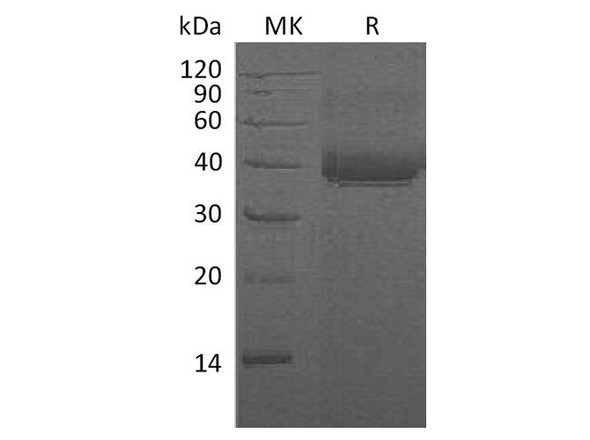Description
Recombinant Human Fc epsilon RII/CD23 Protein
The Recombinant Human Fc epsilon RII/CD23 Protein is a biologically active recombinant protein that plays a significant role in various cellular processes and signaling pathways in human biology. This protein is widely employed in immunological research, cell biology studies, protein-protein interaction analyses, and therapeutic development, providing researchers with a reliable tool for investigating Fc epsilon RII/CD23 function and its implications in health and disease.
This product (SKU: RPCB1423) is produced using HEK293 cells and features a N-his tag for convenient detection and purification. The protein exhibits a calculated molecular weight of 31.83 kDa with an observed molecular weight of 40 kDa under denaturing conditions, achieving ≥ 95 % as determined by SDS-PAGE., ensuring exceptional quality and consistency for research applications.
Key Features
| High Purity by Affinity Chromatography | |
| Mammalian & Bacterial Expression Systems | |
| High lot-to-lot consistency via strict QC |
| Product Name: | Recombinant Human Fc epsilon RII/CD23 Protein |
| SKU: | RPCB1423 |
| Size: | 10 μg , 20 μg , 50 μg , 100 μg |
| Reactivity: | Human |
| Synonyms: | BLAST-2, CD23, CD23A, CLEC4J, FCE2, IGEBF, FCER2, BLAST-2, Fc fragment of IgE receptor II, CD23, CD23A, CLEC4J, FCE2, IGEBF |
| Tag: | N-his |
| Expression Host: | HEK293 cells |
| Calculated MW: | 31.83 kDa |
| Observed MW: | 40 kDa |
| Gene ID: | 2208 |
| Protein Description: | High quality, high purity and low endotoxin recombinant Recombinant Human Fc epsilon RII/CD23 Protein (RPCB1423), tested reactivity in HEK293 cells and has been validated in SDS-PAGE.100% guaranteed. |
| Endotoxin: | < 0.1 EU/μg of the protein by LAL method. |
| Purity: | ≥ 95 % as determined by SDS-PAGE. |
| Formulation: | Lyophilized from a 0.22 μm filtered solution of PBS, pH 7.4. |
| Reconstitution: | Centrifuge the vial before opening. Reconstitute to a concentration of 0.1-0.5 mg/mL in sterile distilled water. Avoid vortex or vigorously pipetting the protein. For long term storage, it is recommended to add a carrier protein or stablizer (e.g. 0.1% BSA, 5% HSA, 10% FBS or 5% Trehalose), and aliquot the reconstituted protein solution to minimize free-thaw cycles. |
| Storage: | Store at -20℃.Store the lyophilized protein at -20℃ to -80 ℃ up to 1 year from the date of receipt. After reconstitution, the protein solution is stable at -20℃ for 3 months, at 2-8℃ for up to 1 week. |
Fc fragment of IgE, low affinity II, receptor for (CD23) or CD23 antigen is a member of the cluster of differentiation family. The cluster of differentiation (cluster of designation) (often abbreviated as CD) is a protocol used for the identification and investigation of cell surface molecules present on white blood cells initially but found in almost any kind of cell of the body, providing targets for immunophenotyping of cells. Physiologically, CD molecules can act in numerous ways, often acting as receptors or ligands (the molecule that activates a receptor) important to the cell. A signal cascade is usually initiated, altering the behavior of the cell (see cell signaling). Some CD proteins do not play a role in cell signaling, but have other functions, such as cell adhesion. CD23/FCER2 is a B-cell specific antigen, and a low-affinity receptor for IgE. It has essential roles in B cell growth and differentiation, and the regulation of IgE production. This protein also exists as a soluble secreted form, then functioning as a potent mitogenic growth factor. Increased levels of soluble CD23/FCER2 cause the recruitment of non-sensitised B-cells in the presentation of antigen peptides to allergen-specific B-cells, therefore increasing the production of allergen specific IgE. IgE, in turn, is known to upregulate the cellular expression of CD23 and Fc epsilon RI (high-affinity IgE receptor).







